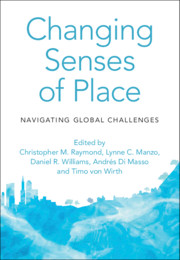Book contents
- Changing Senses of Place
- Changing Senses of Place
- Copyright page
- Dedication
- Contents
- Contributors
- Foreword
- Preface
- Acknowledgements
- Introduction
- Part I Climate Change and Ecological Regime Shifts
- 1 Coral Reef Collapse and Sense of Place in the Great Barrier Reef, Australia
- 2 Navigating the Temporalities of Place in Climate Adaptation
- 3 The Place–Subjectivity Continuum after a Disaster
- 4 Changing Sense of Place and Local Responses to Bengaluru’s Disappearing Lakes
- 5 Place-Making for Regional Conservation
- Part II Migration, Mobility and Belonging
- Part III Renewable Energy Transitions
- Part IV Nationalism and Competing Territorial Claims
- Part V Urban Change
- Part VI Technological and Legal Transformations
- Part VII Design and Planning Strategies for Changing Senses of Place
- Part VIII Conclusion
- Index
- References
5 - Place-Making for Regional Conservation
Negotiating Narratives of Stability and Change
from Part I - Climate Change and Ecological Regime Shifts
Published online by Cambridge University Press: 15 July 2021
- Changing Senses of Place
- Changing Senses of Place
- Copyright page
- Dedication
- Contents
- Contributors
- Foreword
- Preface
- Acknowledgements
- Introduction
- Part I Climate Change and Ecological Regime Shifts
- 1 Coral Reef Collapse and Sense of Place in the Great Barrier Reef, Australia
- 2 Navigating the Temporalities of Place in Climate Adaptation
- 3 The Place–Subjectivity Continuum after a Disaster
- 4 Changing Sense of Place and Local Responses to Bengaluru’s Disappearing Lakes
- 5 Place-Making for Regional Conservation
- Part II Migration, Mobility and Belonging
- Part III Renewable Energy Transitions
- Part IV Nationalism and Competing Territorial Claims
- Part V Urban Change
- Part VI Technological and Legal Transformations
- Part VII Design and Planning Strategies for Changing Senses of Place
- Part VIII Conclusion
- Index
- References
Summary
Human ability to adapt to shifting ecological regimes is tied to flexibility in our senses of place to engage and expand spatial and temporal scales. The challenge of regional conservation is to build intelligible senses of place from a mosaic of land uses that seemingly compete with one another and have difficulties scaling-up to characterise a regional geography. A regional place-making framework is developed that connects ecological relationships, structural forces of society and socio-cultural meanings in ways that negotiate tension between narratives of stability and change. Place-making asserts change as aspirational narratives of what should be, and inclusion of a temporal scale that recognises future states of conditions and relationships across communities. Place-making asserts stability due to concerns for restoring native ecosystems and production of socio-cultural heritage. Regional place-making is where global narratives meet local particularities in ways that integrate and prioritise narratives linked to stability and change.
- Type
- Chapter
- Information
- Changing Senses of PlaceNavigating Global Challenges, pp. 65 - 76Publisher: Cambridge University PressPrint publication year: 2021

